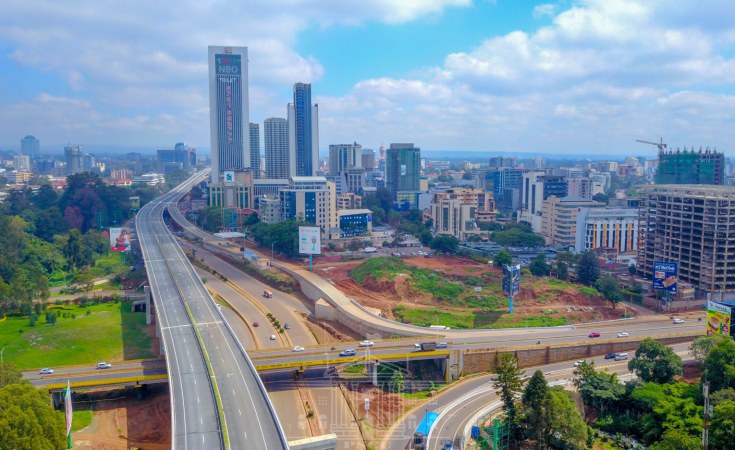Wrapping up his trip to Kenya and Ethiopia, German Chancellor Olaf Scholz stressed the need for more cooperation, ranging from climate and energy policies to migration of skilled labor to Europe.
There was a clear message from Olaf Scholz during his 3-day trip to Ethiopia and Kenya -- Berlin wants to build partnerships on eye level with countries of the Global South.
The German chancellor stressed that today's world was a multipolar place and that he made a strategic decision to visit the African continent for a second time since taking office 17-months ago.
Germany needs to make friends on the continent. China has already gained massive influence in Africa, for instance with big infrastructure programs. And Russia has also started a charm offensive to gain sway. Hence, the US and other Western countries are trying to step up their game.
On a visit to Ethiopia in January, the Chinese foreign minister said that Africa did not need bloc competition but rather solidarity and cooperation. The African Union has already made clear it refuses to be seen as an arena for others to compete for influence. So even though there was no official mention of China during the Scholz trip, it was still the elephant in the room.
An "inspiring climate champion"
Kenya is not one of the countries likely to turn away from the West. This year, Germany and Kenya celebrate 60 years of diplomatic relations -- West Germany was the first country to officially recognize the Republic of Kenya in 1963.
On the last day of his 3-day trip to Ethiopia and Kenya, Olaf Scholz visited Olkaria, the largest geothermal power plant in Africa around 120 kilometers north-west of Nairobi. It covers 50% of Kenya's electricity needs and Germany has been supporting its development for the past two decades.
It stands as a symbol for Kenya's pioneering role on the continent, especially in the energy sector. The country's president, William Ruto, has set the ambitious goal to fully switch to renewable energies in only a few years.
"I am very impressed that Kenya wants to achieve its goal of going from 90% to 100% renewable electricity production by 2030 even faster," the German chancellor said.
Scholz said that Germany was ready to support Kenya in that effort and intended to strengthen its energy and climate partnership with the East African country. The German chancellor called it an "inspiring climate champion."
About a dozen business representatives have joined Scholz on his trip. Kenya being Germany's most important trading partner in the region, there are of course also hopes that German companies will find lucrative investment opportunities in Kenya's energy sector.
AU to become a G20 member soon?
Another step towards engaging on eye level was Scholz' announcement on the first day of his trip to support G20 membership for the African Union.
"We want to support the African Union getting a seat in the G20, so that it can participate and have a say in decision-making. Africa must play a bigger role in international relations, a role that does justice to the continent and its growing population", Scholz said during a joint press conference, noting he was "convinced" the AU would get a seat at the G20 soon.
It's something that would be a big step forward for African countries. For decades, they have been trying to get more international representation. With its 55 member states, the African Union represents the interests of roughly 1.4 billion people. The AU would have a say especially regarding issues such as climate change, that affect many African nations.
Peaceful resolution of Sudan conflict
In Addis Ababa, Scholz also met with Ethiopian Prime Minister Abiy Ahmed and Tigray's President Reda Getachew. There was no press conference but according to a statement by the German government, Berlin supports Ethiopia's transitional justice efforts after the devastating war in Tigray that ended last November.
The current crisis in Sudan was also on the agenda and Scholz stressed Germany's support for a peaceful settlement of the conflict and said he appreciated Kenya as an anchor of stability.
"Kenya is an established democracy and as such the country is a stabilizing player in a very troubled region. We really appreciate the mediation efforts Kenya has put in place over the past few years," Scholz said.
Migration and employment
The German and Kenyan leaders also discussed migration and employment, with Scholz seeing opportunities for Kenya to help with Germany's skilled labor shortage.
"We see great potential in Kenya for skilled labor migration in many areas of our economy," he said.
The German chancellor explained Berlin wanted to strengthen regular labor migration while at the same time reducing irregular migration.
"This is a win-win situation for the countries that participate," he added, with Ruto backing the proposal.
"There is an opportunity for close to 250,000 people to work in Germany from different countries," Ruto said during the joint press conference in Nairobi. "We would value that opening, but we would also undertake that any persons from Kenya who do not measure up to good standing and are against the law in Germany, would be returned to Kenya."
Kenya boasts a large number of skilled workers in the IT and digital sector, with Nairobi being dubbed the "Silicon Savannah" due to its innovative start-up scene.
For Germany, the need for skilled workers is urgent. Labor Minister Hubertus Heil said in parliament last week that all the stops must be pulled to secure jobs and skilled labor, adding that "if we don't do that, we will be short of seven million workers and skilled workers by 2035."
Edited by: Andreas Illmer


